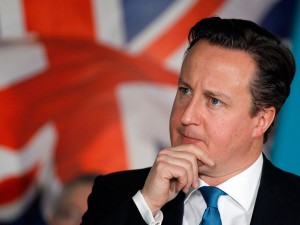The first of a post-election three-part series on civil liberties in the UK examines the government’s proposal to replace the Human Rights Act by a British Bill of Rights.
Prime minister David Cameron was quick to don the mantle of ‘One Nation Toryism’ after his party’s election victory. But the Tories’ priorities set out in their manifesto would suggest that Cameron’s version of ‘One Nation’ owes more to Thatcher and Bush than to its inventor Harold Macmillan.

Human rights de-universalised
When the prime minister condemned the ‘poisonous extremism’ allowed to flourish through ‘passive tolerance’ [1], he was probably not thinking of the extremism which in last month’s Sun saw migrants described as ‘cockroaches’. UN Human Rights Commissioner Zeid Ra’ad Al Hussein [2] observed that this was language similar to that used by the Nazis and by Rwandan media commentators later convicted of incitement to genocide. For the government, it seems, while vigorous debate in schools and universities is too dangerous to tolerate and is to be curbed by further counter-extremism measures to be announced in the Queen’s Speech, media savaging of migrants and Muslims is to be protected and cherished rather than checked.
The selective protection of freedom of speech reflects the attitude to human rights generally, which are to be effectively de-universalised by the promised scrapping of the Human Rights Act and its replacement with a British Bill of Rights.
A British Bill of Rights
Although no proposals or draft Bill have yet been published, Chris Grayling’s October 2014 proposals [3] gave some indication of what they could look like.  Grayling, then justice minister, claimed that all the rights in the Human Rights Convention would be contained in the British Bill of Rights – but that some would be redefined (for instance, the ban on ‘degrading treatment’ would catch a narrower range of treatment than that currently banned), while others, deemed ‘trivial’, would not be enforceable through the courts (raising questions such as which fundamental human rights are trivial, who decides, and why include them if they can’t be enforced?). Yet other rights would be granted only to those who deserve them (demolishing the essential foundation for human rights, a recognition that they are inherent in the human person and thus universal, although they can be restricted to prevent crime, disorder etc). The Bill would remove human rights protection against British officials’ conduct abroad, allowing soldiers to torture captives with impunity. Our courts would be told no longer to take into account rulings from the European human rights court, and parliament would decide whether to follow such rulings or not – they would be ‘advisory’ only. If the Council of Europe refused to accept the new relationship with the Convention, the UK might withdraw.
Grayling, then justice minister, claimed that all the rights in the Human Rights Convention would be contained in the British Bill of Rights – but that some would be redefined (for instance, the ban on ‘degrading treatment’ would catch a narrower range of treatment than that currently banned), while others, deemed ‘trivial’, would not be enforceable through the courts (raising questions such as which fundamental human rights are trivial, who decides, and why include them if they can’t be enforced?). Yet other rights would be granted only to those who deserve them (demolishing the essential foundation for human rights, a recognition that they are inherent in the human person and thus universal, although they can be restricted to prevent crime, disorder etc). The Bill would remove human rights protection against British officials’ conduct abroad, allowing soldiers to torture captives with impunity. Our courts would be told no longer to take into account rulings from the European human rights court, and parliament would decide whether to follow such rulings or not – they would be ‘advisory’ only. If the Council of Europe refused to accept the new relationship with the Convention, the UK might withdraw.
The option of withdrawal from the European Convention on Human Rights flagged up in October 2014 did not make the manifesto. Such a move would have been deeply controversial and a legal and constitutional nightmare, requiring the consent of the devolved governments of Scotland, Wales and Northern Ireland and calling into question the UK’s membership of the Council of Europe. But it is hard to see how the aim of the current proposals – to loosen the UK’s relationship with the European Court of Human Rights so as to allow the government to ignore adverse Court rulings – can be achieved without withdrawing from the Convention. Any tampering with the Human Rights Act will be fraught with legal and constitutional difficulty.
Villains’ charter?
But it is the substance of the proposals, rather than the legal difficulties they might provoke, which is most concerning. The Tories’ stunted vision of human rights is evidenced by the location of the pledge to scrap the Human Rights Act under the heading ‘Fighting crime and standing up for victims’ in the manifesto. The stated purpose of getting rid of the Act is to prevent ‘foreign criminals and terrorists’ from relying on ‘spurious human rights claims’ to defeat deportation.  What a ‘spurious’ human rights claim is, is not explained – but it would certainly not include deportation to a known risk of torture or to a trial based on evidence extracted by torture. Recalling Cameron’s jibe, following the European human rights court’s ruling against Abu Qatada’s deportation to Jordan to be tried on torture evidence, that the court risked becoming a ‘small claims court’, gives further cause for concern as to how a ‘spurious’ claim will be defined. Perhaps the inclusion of the word ‘spurious’ is intended simply to convey the old message that certain categories of people can’t be considered as possessors of human rights.
What a ‘spurious’ human rights claim is, is not explained – but it would certainly not include deportation to a known risk of torture or to a trial based on evidence extracted by torture. Recalling Cameron’s jibe, following the European human rights court’s ruling against Abu Qatada’s deportation to Jordan to be tried on torture evidence, that the court risked becoming a ‘small claims court’, gives further cause for concern as to how a ‘spurious’ claim will be defined. Perhaps the inclusion of the word ‘spurious’ is intended simply to convey the old message that certain categories of people can’t be considered as possessors of human rights.
Perhaps a debate about the Human Rights Act should start here: given the breadth of the Act’s protections, how have we come to the point where the public regard it only as a means of protecting foreign offenders, terrorists and insurgents? Certainly its protections against torture have prevented deportations and have delivered a measure of justice to those ill-treated in captivity by British soldiers in Iraq. But, too, British courts have ruled that children must be protected from violence, police must protect targets of crime from known imminent threats; relatives of those dying in custody must be able to participate in investigations; the outlawing of discrimination in the enjoyment of rights has transformed the rights of same-sex partners and the disabled; private life rights encompass freedom from noise nuisance and air pollution. More importantly, the Act has begun to create a culture where the human rights implications of policy must be considered, where law and policy are expected to be clear and accessible, where transparency and accountability are demanded of government. In those ways, the Act has empowered everyone.
Whose human rights?
Ironically, the depiction of the Act as a villains’ charter, peddled relentlessly by the right-wing press for over a decade, obscures one of its big anomalies – that many of its beneficiaries are large corporations. It seems counter-intuitive and wrong to award corporations human rights, given their role as large-scale violators of human rights, whether in the destruction and poisoning of the environment and of people’s livelihoods, or the ever-worsening conditions imposed on workers in pursuit of profit – but corporations use the Act to protect such rights as ‘peaceful enjoyment of property’ and ‘freedom of speech’ (advertising, lobbying etc), in the UK courts.
The government’s claim to be the guardian of fundamental values is belied by its utter refusal to take in any of the Mediterranean ‘boat people’ or to approve enlargement of search and rescue operations, instead pushing a policy of destroying the migrants’ boats by military action – a policy risking far more lives as it prevents flight from war or persecution, or leaves refugees stranded in lawless transit countries.
An alternative approach
While the Tories claim an electoral mandate for their anti-human policies, the new social movements which demand secure, decent and affordable housing, work which guarantees a decent standard of living, benefits which do not punish sickness or disability, a public NHS and fair taxation are pointing the way back to the more expansive conception of human rights conceived by the founders of modern human rights law.
 At the back of all human rights documents is the protection of human dignity. Rights to work, with decent pay and conditions, and rights to a decent standard of living ensuring health and well-being, including adequate food, clothing, housing, medical care, social services and social security, were seen as central to human dignity and defined as fundamental, basic human rights in the 1948 Universal Declaration on Human Rights (UDHR), the foundational document of modern human rights law. This is often forgotten, because the HRA and the ECHR which it incorporates contain only a small selection of the rights set out in the UDHR. The ‘economic and social’ rights omitted from the European Convention were incorporated in the 1966 International Covenant on Economic, Social and Cultural Rights (ICESCR), but that Covenant has no enforcement mechanism akin to the ECtHR.
At the back of all human rights documents is the protection of human dignity. Rights to work, with decent pay and conditions, and rights to a decent standard of living ensuring health and well-being, including adequate food, clothing, housing, medical care, social services and social security, were seen as central to human dignity and defined as fundamental, basic human rights in the 1948 Universal Declaration on Human Rights (UDHR), the foundational document of modern human rights law. This is often forgotten, because the HRA and the ECHR which it incorporates contain only a small selection of the rights set out in the UDHR. The ‘economic and social’ rights omitted from the European Convention were incorporated in the 1966 International Covenant on Economic, Social and Cultural Rights (ICESCR), but that Covenant has no enforcement mechanism akin to the ECtHR.
The popularity of the Human Rights Act would be immeasurably enhanced by inclusion of the rights demanded by these movements – the right to adequate and affordable housing, the right to a livelihood, to decent working conditions and fair contract terms, and the right to adequate subsistence for those unable to work. The ability to enforce these rights is something that is sorely needed in the UK at present, but the mechanisms for doing so – social housing, the protection of fair rents and security of tenure for tenants, a strong union movement, legislation protecting workers’ rights and an affordable and accessible tribunal for enforcing them – have been eroded or abolished during the neoliberal decades since Thatcher. It may be time to reclaim these rights as fundamental human rights, in the name of a more inclusive and humane society.
Related links
IRR News story: ‘Human rights: the assault continues‘
IRR News article: ‘Human rights – at the government’s discretion‘
IRR News story: ‘Foreign criminals, the press and the judges‘
IRR briefing paper: ‘Europe’s pariah state? The future of human rights in Britain‘

The wealthy and the middle class who are their cheerleaders.